Sex and the City
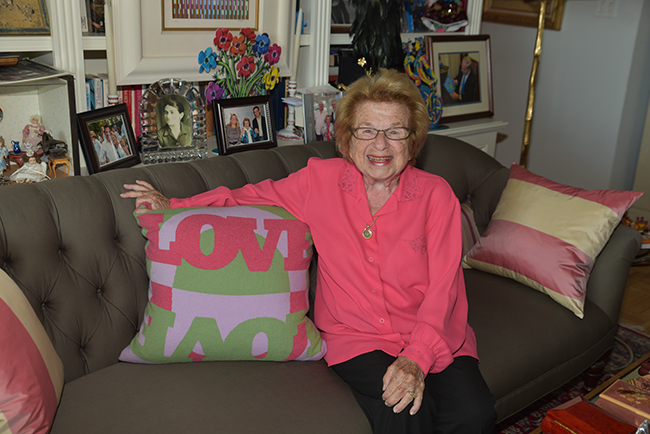
By Anthony Rapacciuolo
SEX!! There I said it. Now that I have your attention, riddle me this, what do you get when you combine a self-proclaimed “old-fashioned square” with a psychosexual therapist? Why Dr. Ruth Westheimer of course!
This fiery 88-year-old New Yorker has dedicated her life to educating and counseling people of all ages about sex. In fact, over the years she’s managed to take a conversation that was once considered taboo, and has given it a global audience.
Born in Germany, Ruth made what were humble beginnings riddled with hardships and immigrated to New York where she received her Master’s Degree in Sociology from the Graduate Faculty of the New School and Social Research and later her Doctorate of Education in the Study of the Family from the Columbia University Teacher’s College.
Ruth went on to work at Planned Parenthood which was the “spark” that made her further her education in human sexuality by studying under Dr. Helen Singer Kaplan at Cornell University Medical Center. She then taught at Yale, Princeton, Columbia University, West Point and others.
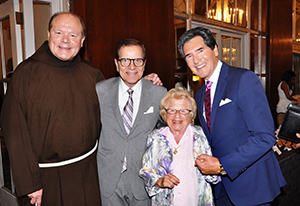 Father Francis Gasparik, Joseph Sano, Dr. Ruth Westheimer, Ernie Anastos
Father Francis Gasparik, Joseph Sano, Dr. Ruth Westheimer, Ernie AnastosWhile she was proud to be spreading “sexual literacy” in the world of academia, Ruth never pictured herself leveraging other means of communication to spread her message, but in 1980 that all changed with a fifteen-minute radio segment on WYNY-FM. That proverbial “fifteen minutes of fame” lead to her radio show, television shows, home videos, a play written about her life, a board game entitled Dr. Ruth’s Game of Good Sex, and newspaper columns. It even led to her line of wine and, of course, don’t forget the 41 books that she’s authored since that time.
New York Lifestyles Magazine had the pleasure of speaking with the famed Doctor who told us about her journey, the importance of healthy relationships and families, and even what in her “expert opinion” is the biggest myth surrounding sex.
First off, can you tell our readers how you began this journey?
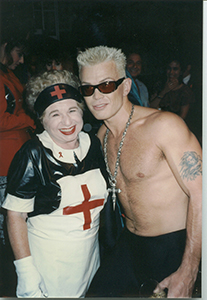 Dr. Ruth Westheimer, Billy Idol
Dr. Ruth Westheimer, Billy IdolI began as a professor at Lehman College training others how to teach sex education. I then furthered my education by enrolling in a program at Cornell to become a psychosexual therapist. I spent seven years there: two receiving training and five more training others in the school. One day we received a request to send someone to speak with a group of community affairs managers in the media about the need for sex education. There was no money attached to the request, so needless to say no one wanted to go. I, on the other hand, would have flown a balloon if I had to so that I could speak to the broadcasters about the need for sexual education to be a part of the media. After speaking with them, I thought I would maybe be a consultant for the program. You hear my accent it’s the same now as it was then. Never in my wildest dreams did I think they would ask me to do the show, but they gave me fifteen minutes on a Sunday night at a quarter past midnight that week and look what happened!
Explain to our readers what you mean by the term “Sexual Literacy.”
When I say sexually literacy, I don’t only mean how a baby is born. When I say sexual literacy, I also mean the importance of relationships, because to have good sex you have to have a good relationship, and a good partner.
Based on your history, it seems you’re able to educate people of all ages. Tell us how you would discuss the topic with children?
When I speak with children, I don’t want adults there. I want them to ask questions that they would not ask when parents are present. We need parents to be able to talk to their kids when they have questions. I explain to children that there’s nothing to be embarrassed about when it comes to sexuality.
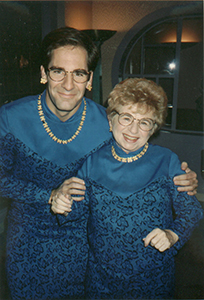 Scott Bakula, Dr. Ruth Westheimer
Scott Bakula, Dr. Ruth WestheimerHow does that conversation change when you’re speaking with teenagers and young adults?
I stress to them not to engage in any sexual activity just because they may think they have to or because others around them are doing it. I tell them not to let anyone or anything pressure them into doing something they are not ready to do. They need to have a relationship first, they must be sexually knowledgeable, and they must be familiar with the person.
So how does the dialogue and sex itself change as people get older? Say after 50 and even after 80 years old?
The book that I wrote Sex After 50 explains what sexual literacy means as you age. Men need to understand that their body doesn’t respond the same as when they were younger. Women need to take the proper measures to ensure there isn’t pain involved. I don’t want people to hurt when they are engaging in good sex. Older people also need to understand that as you age, the morning becomes the best time for sexual activity as opposed to the evening.
New York is the city that never sleeps, does that hurt or help a New Yorker’s sex life?
I think New York is the best city for lovers. It has so many things for couples to do at every age and for every budget. Sometimes it seems to be an expensive city, but there are things you can do that are not so expensive. For example, take a ferry ride to Staten Island when the moon is shining.
What’s the biggest myth or misconception related to sex?
The general population thinks that a larger male organ is more pleasurable for a woman, and there are also many other misconceptions as well. In my way of teaching, the most important thing is when a couple looks at each other across the room with that little smile—that’s all that’s needed to have a good sexual experience. A man’s size has nothing to do with the pleasurable experience of sexuality.
On a personal level, you’ve already done so much; you’ve authored books, created games, appeared on TV and radio, etc. What’s next for Dr. Ruth?
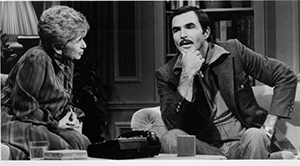 Dr. Ruth Westheimer, Burt Reynolds
Dr. Ruth Westheimer, Burt ReynoldsFantastic question! Before this interview, I had a conversation with a TV producer at PBS about doing a new program based on my book Sex After 50 which won a Mature Book Award. Not bad for 88 years old!
What’s the future of sex in your opinion?
I think the future will be that more and more people will be talking about sex, and because of that people are going to become sexually more literate.
What’s the best piece of advice you can give our readers?
The best advice is to be optimistic. If you are lonely, go out to a concert or a movie and see who sits next to you and start up a conversation. Be sure, however, before going out that you aren’t sexually frustrated, to begin with. Otherwise, you’ll get sad if you don’t meet anyone.
Sound off! Tell our readers something they don’t know about you.
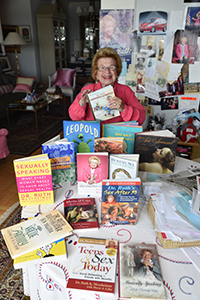
What they don’t know about me is that I’m old-fashioned and a square. I also collect turtles, not live turtles! A turtle is safe if it stays in one place and nothing can hurt it. If that turtle wants to move it has to stick its neck out to take a risk. Otherwise, it cannot move. That also holds true for relationships of all ages. People have to take a chance to start new relationships so that they are not lonely and sad. I also like turtles because they carry their homes on their backs. I didn’t have a home from the age of ten and a half, when I left my parents in Germany because of World War II, until much later in life.
Finally, I like turtles so much I wrote a children’s book recently called Leopold about a turtle who needs to take a risk and face its fears. It’s a parable that demonstrates to children that facing your fears can set you free. That’s a powerful message to be learned at a young age.



